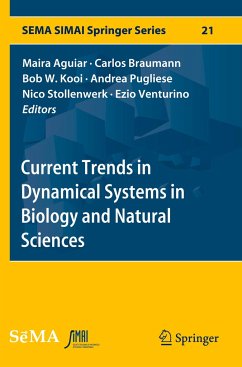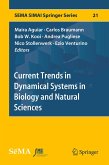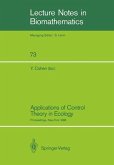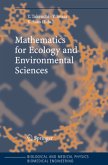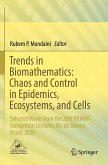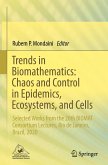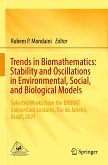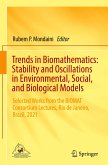Current Trends in Dynamical Systems in Biology and Natural Sciences
Herausgegeben:Aguiar, Maira; Braumann, Carlos; Kooi, Bob W.; Pugliese, Andrea; Stollenwerk, Nico; Venturino, Ezio
Current Trends in Dynamical Systems in Biology and Natural Sciences
Herausgegeben:Aguiar, Maira; Braumann, Carlos; Kooi, Bob W.; Pugliese, Andrea; Stollenwerk, Nico; Venturino, Ezio
- Broschiertes Buch
- Merkliste
- Auf die Merkliste
- Bewerten Bewerten
- Teilen
- Produkt teilen
- Produkterinnerung
- Produkterinnerung
This book disseminates the latest results and envisages new challenges in the application of mathematics to various practical situations in biology, epidemiology, and ecology. It comprises a collection of the main results presented at the Ninth Edition of the International Workshop "Dynamical Systems Applied to Biology and Natural Sciences - DSABNS", held from 7 to 9 February 2018 at the Department of Mathematics, University of Turin, Italy. While the principal focus is ecology and epidemiology, the coverage extends even to waste recycling and a genetic application. The topics covered in the…mehr
Andere Kunden interessierten sich auch für
![Current Trends in Dynamical Systems in Biology and Natural Sciences Current Trends in Dynamical Systems in Biology and Natural Sciences]() Current Trends in Dynamical Systems in Biology and Natural Sciences93,99 €
Current Trends in Dynamical Systems in Biology and Natural Sciences93,99 €![Applications of Control Theory in Ecology Applications of Control Theory in Ecology]() Applications of Control Theory in Ecology41,99 €
Applications of Control Theory in Ecology41,99 €![Mathematics for Ecology and Environmental Sciences Mathematics for Ecology and Environmental Sciences]() Mathematics for Ecology and Environmental Sciences77,99 €
Mathematics for Ecology and Environmental Sciences77,99 €![Trends in Biomathematics: Chaos and Control in Epidemics, Ecosystems, and Cells Trends in Biomathematics: Chaos and Control in Epidemics, Ecosystems, and Cells]() Trends in Biomathematics: Chaos and Control in Epidemics, Ecosystems, and Cells108,99 €
Trends in Biomathematics: Chaos and Control in Epidemics, Ecosystems, and Cells108,99 €![Trends in Biomathematics: Chaos and Control in Epidemics, Ecosystems, and Cells Trends in Biomathematics: Chaos and Control in Epidemics, Ecosystems, and Cells]() Trends in Biomathematics: Chaos and Control in Epidemics, Ecosystems, and Cells108,99 €
Trends in Biomathematics: Chaos and Control in Epidemics, Ecosystems, and Cells108,99 €![Trends in Biomathematics: Stability and Oscillations in Environmental, Social, and Biological Models Trends in Biomathematics: Stability and Oscillations in Environmental, Social, and Biological Models]() Trends in Biomathematics: Stability and Oscillations in Environmental, Social, and Biological Models108,99 €
Trends in Biomathematics: Stability and Oscillations in Environmental, Social, and Biological Models108,99 €![Trends in Biomathematics: Stability and Oscillations in Environmental, Social, and Biological Models Trends in Biomathematics: Stability and Oscillations in Environmental, Social, and Biological Models]() Trends in Biomathematics: Stability and Oscillations in Environmental, Social, and Biological Models108,99 €
Trends in Biomathematics: Stability and Oscillations in Environmental, Social, and Biological Models108,99 €-
-
-
This book disseminates the latest results and envisages new challenges in the application of mathematics to various practical situations in biology, epidemiology, and ecology. It comprises a collection of the main results presented at the Ninth Edition of the International Workshop "Dynamical Systems Applied to Biology and Natural Sciences - DSABNS", held from 7 to 9 February 2018 at the Department of Mathematics, University of Turin, Italy. While the principal focus is ecology and epidemiology, the coverage extends even to waste recycling and a genetic application. The topics covered in the 12 peer-reviewed contributions involve such diverse mathematical tools as ordinary and partial differential equations, delay equations, stochastic equations, control, and sensitivity analysis. The book is intended to help both in disseminating the latest results and in envisaging new challenges in the application of mathematics to various practical situations in biology, epidemiology, andecology.
Produktdetails
- Produktdetails
- SEMA SIMAI Springer Series 21
- Verlag: Springer / Springer International Publishing / Springer, Berlin
- Artikelnr. des Verlages: 978-3-030-41122-0
- 1st edition 2020
- Seitenzahl: 256
- Erscheinungstermin: 7. Mai 2021
- Englisch
- Abmessung: 235mm x 155mm x 15mm
- Gewicht: 394g
- ISBN-13: 9783030411220
- ISBN-10: 3030411222
- Artikelnr.: 61431234
- Herstellerkennzeichnung Die Herstellerinformationen sind derzeit nicht verfügbar.
- SEMA SIMAI Springer Series 21
- Verlag: Springer / Springer International Publishing / Springer, Berlin
- Artikelnr. des Verlages: 978-3-030-41122-0
- 1st edition 2020
- Seitenzahl: 256
- Erscheinungstermin: 7. Mai 2021
- Englisch
- Abmessung: 235mm x 155mm x 15mm
- Gewicht: 394g
- ISBN-13: 9783030411220
- ISBN-10: 3030411222
- Artikelnr.: 61431234
- Herstellerkennzeichnung Die Herstellerinformationen sind derzeit nicht verfügbar.
Andrea Pugliese is Professor of Mathematical Analysis and Mathematical Biology at the University of Trento. He obtained a Master's in Mathematics at the University La Sapienza of Rome and a PhD in Ecology and Evolution at the State University of New York at Stony Brook. He is the author of more than 90 scientific publications, mainly in the areas of mathematical epidemiology and ecology. He is an editorial board member for the Journal of Mathematical Biology and the Journal of Biological Dynamics. B.W. Kooi's main research interests concern interacting populations in Life Sciences - Ecology, Evolution, Epidemiology and Biochemistry - using mathematical models based on physical/chemical processes at different organizational levels: at the individual level, the Dynamic Energy Budget model, and at higher levels, unstructured/physiologically structured populations and community and ecosystem models. The emphasis is on sensitivity, perturbation, bifurcation,and non-linear dynamics analysis techniques. Carlos A. Braumann is Emeritus Professor in the Department of Mathematics and a member of the Research Centre in Mathematics and Applications, Universidade de Évora, Portugal, working on stochastic differential equations and biological applications. He has been an elected member of the International Statistical Institute since 1992 and has been President of both the European Society for Mathematical and Theoretical Biology (2009-12) and the Portuguese Statistical Society (2006-12). Ezio Venturino received his PhD in Applied Mathematics from SUNY at Stony Brook in 1984. He is currently Professor of Mathematics in the Department of Mathematics, University of Turin, Italy. He has visited a number of international institutions worldwide and has a wide scientific collaboration network. His earlier research focused on numerical analysis, mainly methods for integral equations, and he is currently engaged in research on nonlinear models for biological and ecological applications. Maira Aguiar is a biologist who has also trained in the mathematical modeling of biological systems, with emphasis on nonlinear dynamics, bifurcation analysis, and biostatistics. Her research investigates problems in public health epidemiology, focusing on the dynamics of vector-borne diseases. She has authored more than 35 papers and is frequently invited as a plenary speaker at international scientific meetings. Since 2018 she has been Vice-President of the European Society of Mathematical and Theoretical Biology. Nico Stollenwerk received his PhD in theoretical physics from the University of Clausthal. He previously worked at the Research Center Jülich, Germany and is currently the Principal Investigator of the Mathematical Biology group at CMAF, Lisbon University, where he has designed a Biomathematics PhD course. He is a coauthor of the book "Population Biology and Criticality" and has also coauthored many articles in international journals and more than 40 book chapters, as well as refereeing contributions in international congresses.
1 P. Freguglia et al., Modelling Ecological Systems from a Niche Theory to Lotka-Volterra equations.- 2 N. Petrovskaya and W. Zhang, Accurate Recognition of Spatial Patterns Arising in Spatio-Temporal Dynamics of Invasive Species.- 3 A. Andò and D. Breda, Collocation techniques for structured populations modeled by delay equations.- 4 H. Laurie et al., Herding induced by encounter rate, with predator pressure influencing prey response.- 5 N. M. Brites and C. A. Braumann, Harvesting policies with stepwise effort and logistic growth in a random environment.- 6 C. Corbacho et al., Mathematical modeling of the population dynamics of long-lived raptor species. Application to Eurasian black vulture colonies.- 7 C. Bianchi et al., On the role of inhibition processes in modeling control strategies for composting plants.- 8 A. Martiradonna et al., Optimal control of invasive species with budget constraint: qualitative analysis and numerical approximation.- 9 S. Anita et al., A Shape Optimization Problem Concerning the Regional Control of a Class of Spatially Structured Epidemics - Sufficiency Conditions.- 10 A. d'Onofrio and P. Manfredi, The interplay between voluntary vaccination and reduction of risky behavior: a general behavior-implicit SIR model for vaccine preventable infections.- 11 F. Florian and R. Vermiglio, PC-based sensitivity analysis of the basic reproduction number of population and epidemic models.- 12 M. J. Wieteska, Linear dynamics of mRNA expression and hormone concentration levels in primary cultures of bovine granulosa cells.
1 P. Freguglia et al., Modelling Ecological Systems from a Niche Theory to Lotka-Volterra equations.- 2 N. Petrovskaya and W. Zhang, Accurate Recognition of Spatial Patterns Arising in Spatio-Temporal Dynamics of Invasive Species.- 3 A. Andò and D. Breda, Collocation techniques for structured populations modeled by delay equations.- 4 H. Laurie et al., Herding induced by encounter rate, with predator pressure influencing prey response.- 5 N. M. Brites and C. A. Braumann, Harvesting policies with stepwise effort and logistic growth in a random environment.- 6 C. Corbacho et al., Mathematical modeling of the population dynamics of long-lived raptor species. Application to Eurasian black vulture colonies.- 7 C. Bianchi et al., On the role of inhibition processes in modeling control strategies for composting plants.- 8 A. Martiradonna et al., Optimal control of invasive species with budget constraint: qualitative analysis and numerical approximation.- 9 S. Anita et al., A Shape Optimization Problem Concerning the Regional Control of a Class of Spatially Structured Epidemics - Sufficiency Conditions.- 10 A. d'Onofrio and P. Manfredi, The interplay between voluntary vaccination and reduction of risky behavior: a general behavior-implicit SIR model for vaccine preventable infections.- 11 F. Florian and R. Vermiglio, PC-based sensitivity analysis of the basic reproduction number of population and epidemic models.- 12 M. J. Wieteska, Linear dynamics of mRNA expression and hormone concentration levels in primary cultures of bovine granulosa cells.

